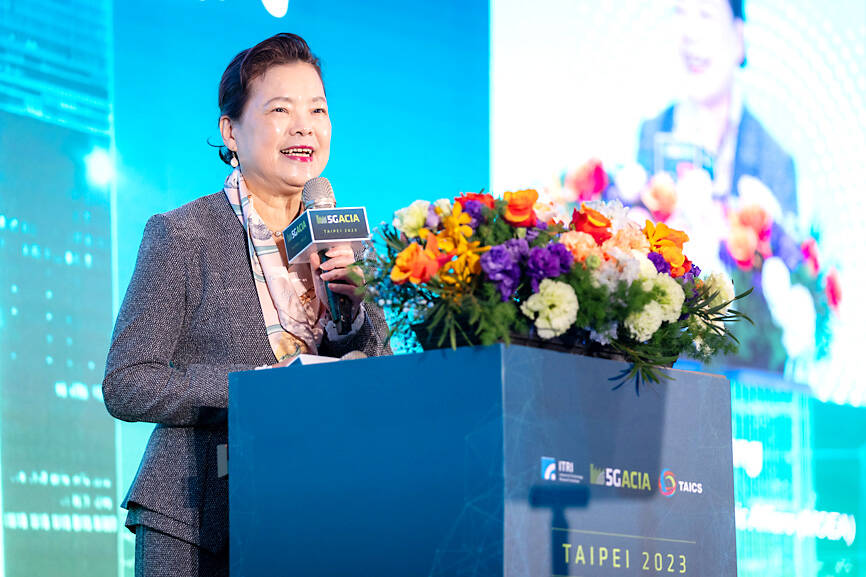A new list of core technologies, including semiconductor process technologies, that are subject to tighter controls is not likely to affect Taiwanese vendors, Minister of Economic Affairs Wang Mei-hua (王美花) said yesterday.
Speaking to reporters on the sidelines of a ceremony where an agreement was signed on the formation of a 5G alliance in Taiwan, Wang said that the government had discussions with local chipmakers before the list was released.
“I do not think the controls will have any negative impact on Taiwanese semiconductor suppliers,” Wang said. “Instead, the controls aim to protect [Taiwan-developed] critical technologies.”

Photo courtesy of Ministry of Economic Affairs
On Tuesday, the National Science and Technology Council announced a set of 22 technologies subject to tight controls in five major areas: defense, aerospace, agriculture, semiconductors, and information and communications technology.
The 22 technologies include 14-nanometer and more advanced chipmaking process technologies and advanced IC packaging and testing technologies, including processes involving silicon photonics integration development and related specialty raw materials and equipment.
The National Security Act (國家安全法) stipulates that people who steal key technologies and leak them to China, Macau, Hong Kong or external hostile forces may be imprisoned for up to 12 years and fined up to two times the profit they garner.
Wang also cited the Act Governing Relations Between the People of the Taiwan Area and the Mainland Area (台灣地區與大陸地區人民關係條例), which states that companies that receive subsidies equal to more than 50 percent of their costs in developing critical technologies should secure approval before sending employees to China.
Industrial Development Administration Director-General Lien Ching-chang (連錦漳) on Tuesday said that Taiwan Semiconductor Manufacturing Co (TSMC, 台積電) is unlikely to be negatively affected by the technology controls.
TSMC deploys technologies in Taiwan that are more advanced than 14-nanometer processes, while in China it uses 14-to-16-nanometer processes, which account for 10 to 12 percent of its total sales.
“I don’t expect TSMC to be bothered by the newly announced technology controls,” Lien said, adding that the controls on 14-nanometer or more advanced processes were in line with international standards, referring to the US.
Taiwan accounts for more than 70 percent of global production of 14-nanometer and more advanced chips.
Smaller contract chipmaker United Microelectronics Corp (UMC, 聯電) said it would follow the new tech controls, adding that 14-nanometer process technology deployment is limited to Taiwan, while it uses 22 and 28-nanometer processes in China.
Taiwan Institute of Economics Research researcher Arisa Liu (劉佩真) said the government’s move to tighten controls on critical technologies is needed, as Taiwan not only has to build a local semiconductor supply chain, but also must prevent leaks, in particular at a time when China is keen to poach Taiwanese engineers.

STIMULUS PLANS: An official said that China would increase funding from special treasury bonds and expand another program focused on key strategic sectors China is to sharply increase funding from ultra-long treasury bonds this year to spur business investment and consumer-boosting initiatives, a state planner official told a news conference yesterday, as Beijing cranks up fiscal stimulus to revitalize its faltering economy. Special treasury bonds would be used to fund large-scale equipment upgrades and consumer goods trade-ins, said Yuan Da (袁達), deputy secretary-general of the Chinese National Development and Reform Commission. “The size of ultra-long special government bond funds will be sharply increased this year to intensify and expand the implementation of the two new initiatives,” Yuan said. Under the program launched last year, consumers can

Citigroup Inc and Bank of America Corp said they are leaving a global climate-banking group, becoming the latest Wall Street lenders to exit the coalition in the past month. In a statement, Citigroup said while it remains committed to achieving net zero emissions, it is exiting the Net-Zero Banking Alliance (NZBA). Bank of America said separately on Tuesday that it is also leaving NZBA, adding that it would continue to work with clients on reducing greenhouse gas emissions. The banks’ departure from NZBA follows Goldman Sachs Group Inc and Wells Fargo & Co. The largest US financial institutions are under increasing pressure

TRENDS: The bitcoin rally sparked by US president-elect Donald Trump’s victory has slowed down, partly due to outflows from exchange-traded funds for the token Gold is heading for one of its biggest annual gains this century, with a 27 percent advance that has been fueled by US monetary easing, sustained geopolitical risks and a wave of purchases by central banks. While bullion has ticked lower since US president-elect Donald Trump’s sweeping victory in last month’s election, its gains this year still outstrip most other commodities. Base metals have had a mixed year, while iron ore has tumbled, and lithium’s woes have deepened. The varied performances highlight the absence of a single, over-riding driver that has steered the complex’s fortunes, while also putting the spotlight

Ibiden Co, the dominant supplier of chip package substrates used in Nvidia Corp’s cutting-edge semiconductors, might need to dial up the pace of production capacity increases to keep up with demand, company CEO Koji Kawashima said. Sales of the 112-year-old company’s artificial intelligence (AI)-use substrates are robust, with customers buying up all that Ibiden has, Kawashima said. That demand is likely to last at least through next year, he added. Ibiden is building a new substrate factory in Gifu Prefecture, Japan, which is expected to go online at 25 percent production capacity around the last quarter of next year before reaching 50